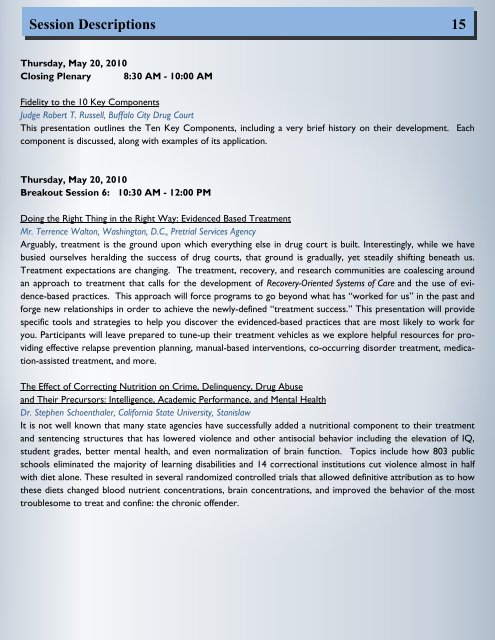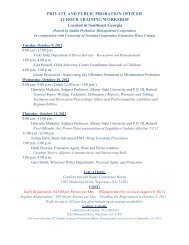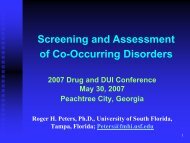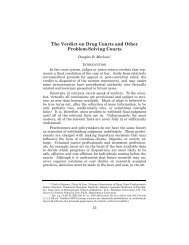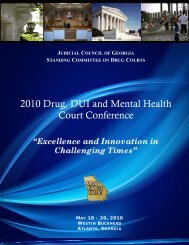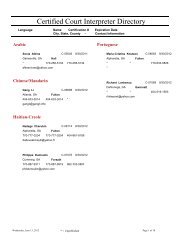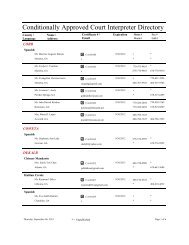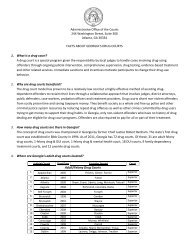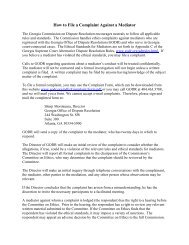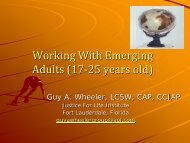2010 Drug, DUI and Mental Health Court Conference
2010 Drug, DUI and Mental Health Court Conference
2010 Drug, DUI and Mental Health Court Conference
Create successful ePaper yourself
Turn your PDF publications into a flip-book with our unique Google optimized e-Paper software.
Session Descriptions 15<br />
Thursday, May 20, <strong>2010</strong><br />
Closing Plenary 8:30 AM - 10:00 AM<br />
Fidelity to the 10 Key Components<br />
Judge Robert T. Russell, Buffalo City <strong>Drug</strong> <strong>Court</strong><br />
This presentation outlines the Ten Key Components, including a very brief history on their development. Each<br />
component is discussed, along with examples of its application.<br />
Thursday, May 20, <strong>2010</strong><br />
Breakout Session 6: 10:30 AM - 12:00 PM<br />
Doing the Right Thing in the Right Way: Evidenced Based Treatment<br />
Mr. Terrence Walton, Washington, D.C., Pretrial Services Agency<br />
Arguably, treatment is the ground upon which everything else in drug court is built. Interestingly, while we have<br />
busied ourselves heralding the success of drug courts, that ground is gradually, yet steadily shifting beneath us.<br />
Treatment expectations are changing. The treatment, recovery, <strong>and</strong> research communities are coalescing around<br />
an approach to treatment that calls for the development of Recovery-Oriented Systems of Care <strong>and</strong> the use of evidence-based<br />
practices. This approach will force programs to go beyond what has “worked for us” in the past <strong>and</strong><br />
forge new relationships in order to achieve the newly-defined “treatment success.” This presentation will provide<br />
specific tools <strong>and</strong> strategies to help you discover the evidenced-based practices that are most likely to work for<br />
you. Participants will leave prepared to tune-up their treatment vehicles as we explore helpful resources for providing<br />
effective relapse prevention planning, manual-based interventions, co-occurring disorder treatment, medication-assisted<br />
treatment, <strong>and</strong> more.<br />
The Effect of Correcting Nutrition on Crime, Delinquency, <strong>Drug</strong> Abuse<br />
<strong>and</strong> Their Precursors: Intelligence, Academic Performance, <strong>and</strong> <strong>Mental</strong> <strong>Health</strong><br />
Dr. Stephen Schoenthaler, California State University, Stanislaw<br />
It is not well known that many state agencies have successfully added a nutritional component to their treatment<br />
<strong>and</strong> sentencing structures that has lowered violence <strong>and</strong> other antisocial behavior including the elevation of IQ,<br />
student grades, better mental health, <strong>and</strong> even normalization of brain function. Topics include how 803 public<br />
schools eliminated the majority of learning disabilities <strong>and</strong> 14 correctional institutions cut violence almost in half<br />
with diet alone. These resulted in several r<strong>and</strong>omized controlled trials that allowed definitive attribution as to how<br />
these diets changed blood nutrient concentrations, brain concentrations, <strong>and</strong> improved the behavior of the most<br />
troublesome to treat <strong>and</strong> confine: the chronic offender.


